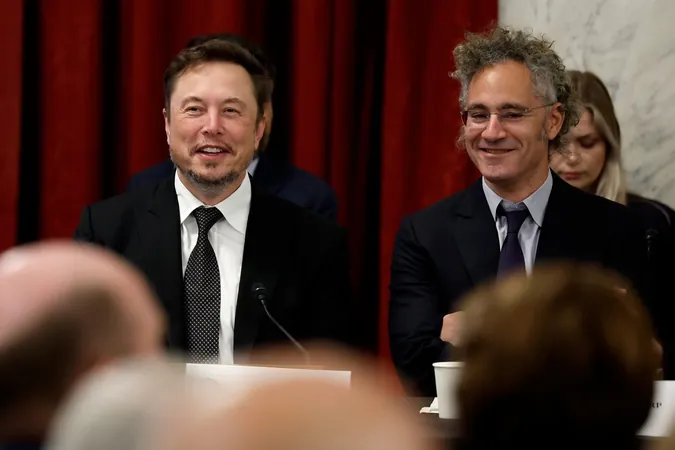
SpaceX, Palantir, and OpenAI Join Forces to Challenge Defense Industry Giants - What This Means for National Security!
2024-12-23
Author: Ying
Introduction
In a surprising turn of events, major players in the tech industry—SpaceX, Palantir, and OpenAI—are reportedly in discussions to form a coalition that aims to disrupt the current defense contractor landscape and seize lucrative contracts from the Pentagon. According to a report by the Financial Times, this new consortium, expected to be announced as soon as January, seeks to challenge established defense giants such as Lockheed Martin, Raytheon, and Boeing, which have long dominated the field.
Financial Stakes
The stakes are high; the Department of Defense's Fiscal Year 2023 review reveals that these legacy companies raked in an impressive $61.4 billion (Lockheed Martin), $24.1 billion (Raytheon), and $20.1 billion (Boeing) in government contracts. Lockheed Martin, for instance, generated 71% of its total revenue from government dealings, raising concerns about the implications of having such significant reliance on state contracts without adequate government oversight.
Ethical Considerations
The consortium's mission is to redefine how national defense contracts are awarded, potentially improving the safety and security of the nation. However, the nature of these tech firms raises ethical questions. Palantir, known for its advanced AI systems, has been criticized for its controversial role in military operations and its support for government initiatives that have faced ethical scrutiny, such as its involvement with U.S. Immigration and Customs Enforcement (ICE) under the Trump administration.
Anduril, another tech company involved, has gained notoriety for its development of surveillance technology at the U.S.-Mexico border and autonomous weapons systems. As tensions rise regarding the ethics of warfare and surveillance, the goals of these firms may not align with the broader public interest.
Concerns at OpenAI
OpenAI's recent collaboration with Anduril to create anti-drone systems has already sparked concerns among its staff, with many employees expressing opposition to the company’s pivot towards defense work. This shift is even more questionable following OpenAI's decision to revise its usage policy to allow military applications, raising concerns about the moral implications of such technology.
Influence of Peter Thiel
Furthermore, the influence of Peter Thiel, a controversial figure in the tech world, looms large over this consortium. Thiel, a co-founder of both Palantir and OpenAI, has been a significant investor in Anduril and SpaceX, pushing an agenda that prioritizes technological advancement often at the expense of ethical considerations. As highlighted by biographer Max Chafkin, Thiel's approach could potentially undermine democratic norms and institutional integrity.
Conclusion
With the prospect of this new coalition emerging to challenge the entrenched defense contractors, questions arise about whether it will lead to meaningful reform or simply introduce a new set of ethical dilemmas. As this situation develops, keep an eye on how these tech giants navigate the complexities of defense funding and the potential ramifications for military operations and national security at large. Will the tech transformation in the defense sector lead to a more accountable and ethical practice, or will it merely replicate the same issues in a high-tech disguise? Only time will tell!


 Brasil (PT)
Brasil (PT)
 Canada (EN)
Canada (EN)
 Chile (ES)
Chile (ES)
 España (ES)
España (ES)
 France (FR)
France (FR)
 Hong Kong (EN)
Hong Kong (EN)
 Italia (IT)
Italia (IT)
 日本 (JA)
日本 (JA)
 Magyarország (HU)
Magyarország (HU)
 Norge (NO)
Norge (NO)
 Polska (PL)
Polska (PL)
 Schweiz (DE)
Schweiz (DE)
 Singapore (EN)
Singapore (EN)
 Sverige (SV)
Sverige (SV)
 Suomi (FI)
Suomi (FI)
 Türkiye (TR)
Türkiye (TR)